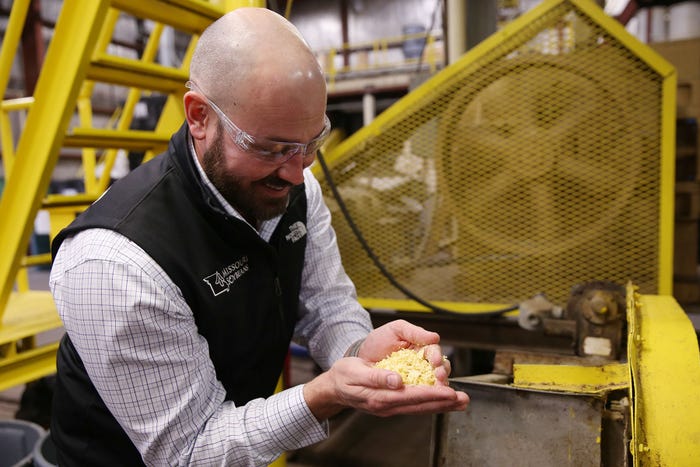
Beck’s Hybrids is creating its footprint in the non-GMO, high-oleic soybean market by adding Soyleic soybeans to its portfolio, but the company will start small this year by offering the seed to farmers in four states.
Soyleic is a non-GMO, high-oleic trait developed by the University of Missouri and patented by the Missouri Soybean Merchandising Council. MSMC and Beck’s recently announced a strategic licensing agreement that will expand the use of these soybeans across the Midwest.
This is the first big push for Beck’s to bring a high-oleic soybean line to its growers.
“We had growers asking for high-oleic, and we wanted to give them an option,” says Trek Murray, Beck’s quality traits market manager.
Bryan Stobaugh, Missouri Soybeans director of licensing and commercialization, says this new agreement works to fulfill the checkoff’s mission to make high-oleic genetics accessible to soybean farmers.
“It gives us a wider network to put feet in front of farmers with a bag of seed in their hand with an opportunity for a premium,” he explains. “Beck’s is the ideal partner to maximize the reach of our technology.”
Expanding high-oleic reach
Beck’s will add to the 19 states where Soyleic soybean varieties are being commercially produced. The company’s focus will be Group 2 to Group 4 maturities.
Farmers in Indiana, Illinois, Ohio and Michigan are a part of the company’s limited launch. Murray says it’s about aligning buyers with growers within the region to meet demand.

HEALTHY CHOICE: Bryan Stobaugh, Missouri Soybeans director of licensing and commercialization, keeps a close eye on opportunities to put Soyleic soybeans in the hands of farmers across the country. The agreement with Beck’s Hybrids is one of the latest endeavors. (Courtesy of Missouri Soybeans)
“Already Zeeland Farm Services in Michigan wants to buy Soyleic soybeans,” he adds. “We’re hoping to bring others on board as well.”
The product of years of conventional soybean breeding, Soyleic soybeans offer a high-oleic fat profile that naturally eliminates trans fats in cooking oils. It also provides processors with two options — selling oil or meal into the non-GMO space.
Why more high-oleic matters
Since the onset of mandatory trans-fat labeling, U.S. soybean farmers have been fighting to regain lost food-oil demand every year.
According to a United Soybean Board report, high-oleic soybeans offer U.S. farmers an opportunity to gain 9 billion pounds of that demand for soybean oil from food, industrial and export customers. Because there is a market for both commodity soybeans and high-oleic soybeans, all farmers will benefit from an increase in demand.
“It is critical that we bring products that are competitive, and I always call it a win-win-win,” Murray says. “It's got to be a win for the grower. It's got be a win for the buyer, and it's got to be a win for Beck’s.”
This strategic partnership, Stobaugh adds, signifies a joint commitment to advancing agricultural practices, fostering growth and ensuring a brighter, more sustainable future for soybean farmers.
About the Author(s)
You May Also Like






